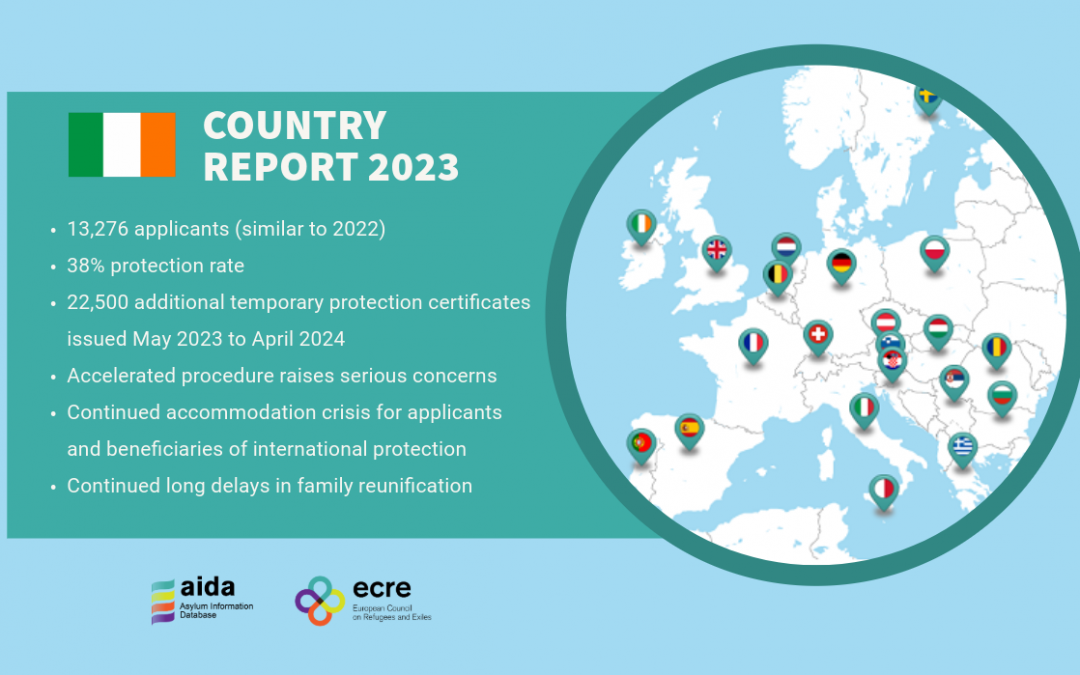The updated AIDA Country Report on Ireland provides a detailed overview of legislative and practice-related developments in asylum procedures, reception conditions, detention of asylum seekers and content of international protection in 2023. It also includes an annex which provides an overview of temporary protection (TP).
In 2023, 13,276 international protection applications were lodged in Ireland. This was similar to the figure in 2022 (13,651) which was the highest ever. The International Protection Office (IPO) issued a total of 8,442 decisions (almost twice as many as in 2022) and 38% of them were positive (compared to 80% in 2022).
As of April 2024, 104,780 TP certificates had been issued in Ireland since March 2022 (compared to 82,196 as of May 2023). 78% of the TP certificate holders had had administrative activity (e.g. changed address, started a training course or a job, etc.) since November 2023, thus indicating how many of them were still living in Ireland. In early 2024, social welfare was reduced for TP beneficiaries living in state provided accommodation. Those who were living in other accommodation were still eligible to apply for support equivalent to that available to Irish nationals.
The accelerated procedure, which was introduced at the end of 2022 for applicants from designated safe countries of origin, continued to operate throughout 2023. Numerous applicants reported that they did not have the opportunity to seek legal advice prior to undergoing their interview either due to the short period of time between their application and interview, or because they were not informed about their right to seek free legal advice from the Legal Aid Board when they submitted their application. In addition, due to the ongoing accommodation crisis, several applicants were interviewed while they were homeless. Although this was denounced as inappropriate by NGOs given the complexity of the asylum procedure, the IPO refused to offer homeless applicants the opportunity to postpone their interviews. The scope of the accelerated procedure has since been broadened by the expansion of the safe countries of origin list, following the inclusion of Algeria and Botswana in January 2024.
Accommodation capacity remained severely constrained throughout 2023 and demand exceeded the International Protection Accommodation Services’ (IPAS) capacity several times during the year. As a result, many applicants were denied accommodation upon arrival. From 4 December onwards, single male applicants were automatically denied accommodation except in cases of identified significant vulnerabilities. Families with children and single women continued to be offered accommodation. Throughout the year, many applicants were forced into homelessness, despite inclement weather conditions and growing anti-immigrant sentiment. In April 2023, the High Court ruled that the State’s failure to provide accommodation, food and basic hygiene facilities to newly arrived applicants was unlawful and breached their right to dignity. In addition, a significant and continuous deterioration of accommodation standards was reported throughout 2023, with an increased reliance on so-called “emergency centres” comprised of disused offices, large conference rooms, etc. Applicants reported overcrowded sites with no access to public services. In January 2023, many residents in a remote former army barracks that had been repurposed as accommodation reported sub-standard, overcrowded living conditions which posed a risk to their personal safety, health, and well-being. Although the State committed to stop using tent accommodation at the end of 2022, it continued to do so in 2023.
Beneficiaries of international protection (BIPs) continued to experience severe delays in the processing of family reunification applications. 2,924 family members were awaiting a decision at the end of 2023. The Department of Justice stated that the average processing time was 12 months. However, the Irish Refugee Council noted that it was longer in practice, often reaching a minimum of 18 months and, in some cases, up to 28 months.
Many BIPs faced risks of or experienced homelessness due to poorly organised transitioning out of the regular IPAS accommodation scheme in 2023. Although it was foreseen that they would either find their own accommodation or be transferred to alternative IPAS accommodation, many of them received transfer notices without a suitable tenancy having been arranged. Even some successful transfers resulted in progress made in education, employment and other integration indicators being lost, as some BIPs were transferred to isolated, unknown areas, far away from the community with which they had created links during their application.
The full report is available here and the annex on temporary protection is available here.
For more information about the AIDA database or to read other AIDA reports, please visit the AIDA website.

